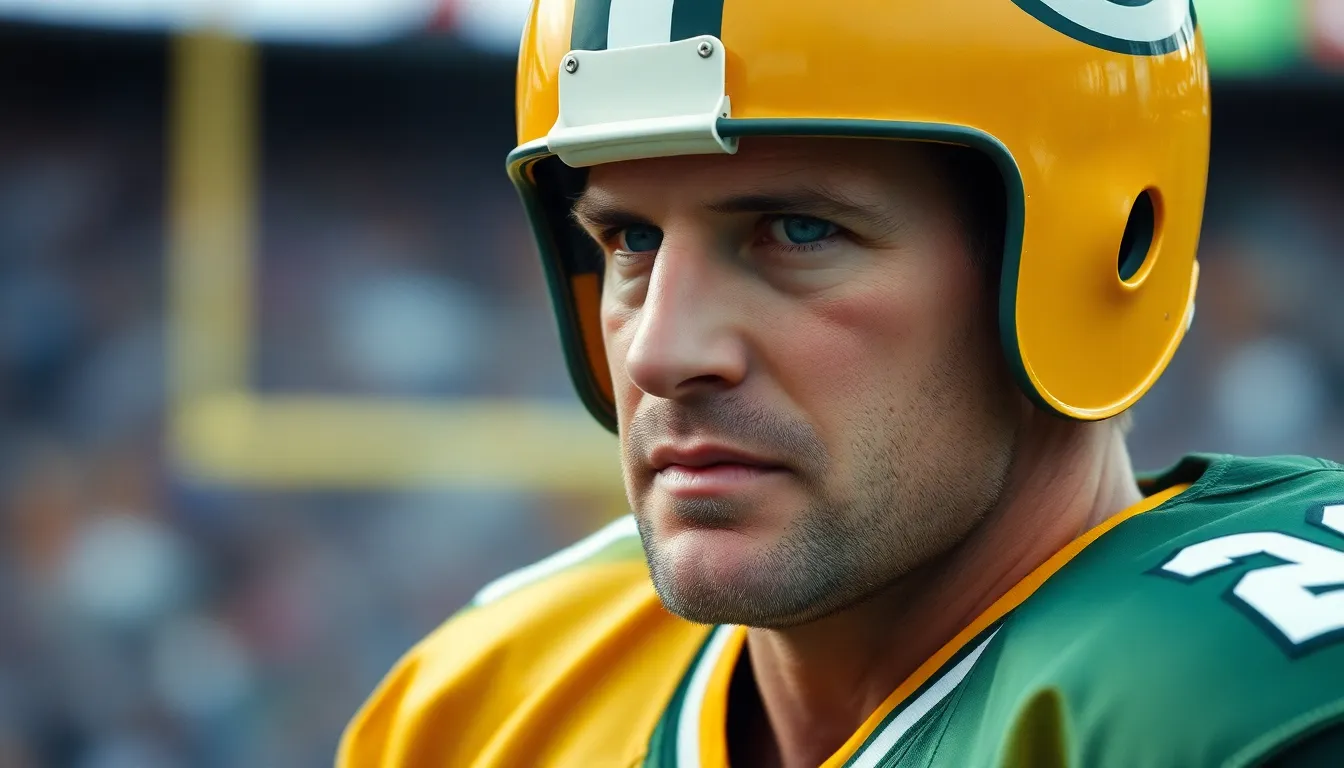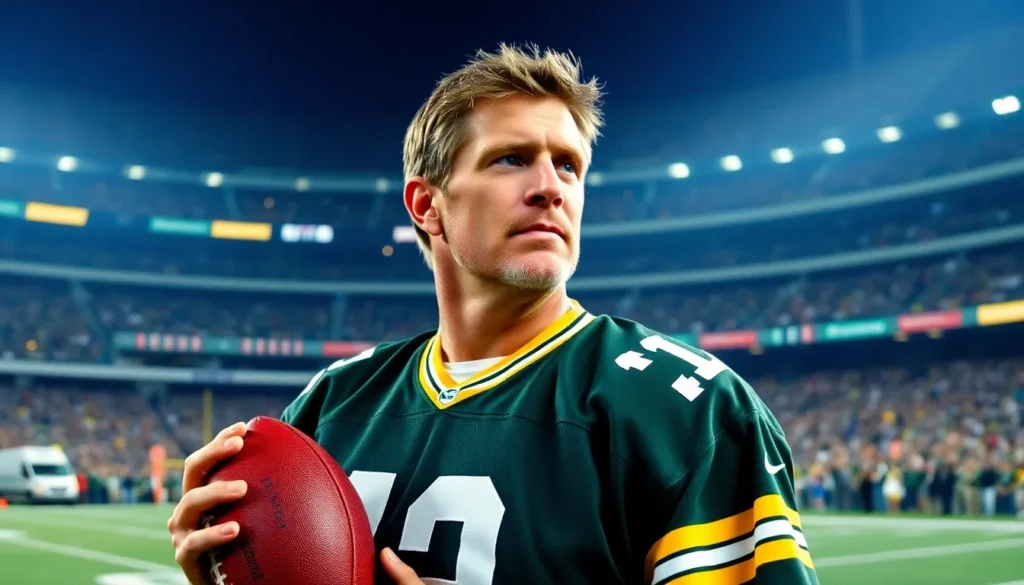Table of Contents
ToggleBrett Favre, a name synonymous with football greatness, captivated fans for over two decades with his incredible arm strength and unyielding spirit. As one of the most celebrated quarterbacks in NFL history, his career was filled with memorable moments and records that still resonate today. But like all great athletes, the time eventually came for him to hang up his cleats.
Fans often wonder when this iconic player officially retired. Favre’s journey in the NFL spanned several teams, with his final retirement marking the end of an era. Understanding the timeline of his career and retirement not only highlights his impact on the game but also reflects the evolution of football itself. Dive into the details of when Brett Favre stepped away from the game and the legacy he left behind.
A Brief Overview of Brett Favre’s Career
Brett Favre, a prominent NFL quarterback, played 20 seasons, primarily with the Green Bay Packers. Favre’s career began in 1991, when the Atlanta Falcons drafted him in the second round. After a year with the Falcons, he joined the Packers, where he achieved legendary status.
Favre’s 1992 season marked his first as a starter, leading to three consecutive MVP awards from 1995 to 1997. He became known for his durability, starting 297 consecutive games, a record that remains unmatched. Favre’s bold playing style produced numerous highlights, including a Super Bowl XXXI victory in 1997.
After his time with the Packers, Favre had stints with the New York Jets and the Minnesota Vikings. His 2009 season with the Vikings was one of his best, culminating in an NFC Championship Game appearance. Favre retired for the first time in March 2008, returned in 2009, then announced his retirement again in 2010.
Favre’s contributions to football extend beyond his records; he reinvented the quarterback position with his fearless approach and leadership. His 71,838 passing yards and 508 touchdown passes rank among the highest in NFL history, solidifying his legacy as one of the sport’s greats.
Milestones Leading to Retirement

Brett Favre’s retirement was preceded by several key milestones and changes throughout his career. These events not only shaped his legacy but also marked significant turning points in his journey as an NFL quarterback.
Key Seasons and Achievements
- 1991-1992: Favre’s rookie season began with the Atlanta Falcons, but he gained prominence after being traded to the Green Bay Packers.
- 1995-1997: Farve’s consecutive MVP awards showcased his dominance in the league, with remarkable performances boosting the Packers’ success.
- 1996: Favre led the Packers to their first Super Bowl victory in 29 years, cementing his place in football history.
- 2007: Favre threw for a career-high 4,155 yards and became the all-time leader in touchdown passes, showcasing his ability to adapt and excel.
- 2009: In his final season with the Minnesota Vikings, he reached the NFC Championship game, further exemplifying his competitiveness.
Changes in Performance
- Late 2000s: Favre’s performance showed signs of decline, reflected in his increasing interceptions and reduced passing accuracy.
- 2008: His first season with the New York Jets ended with a 9-7 record, highlighting struggles with consistency.
- 2009: Although Favre had success with the Vikings, he faced challenges with injuries and uneven performances.
- Retirement Announcement: After considering his future, Favre announced his retirement on March 6, 2010, ending a remarkable 20-season career.
These milestones underscore the trajectory of Favre’s career, illustrating how achievements and changes ultimately led to his decision to retire from professional football.
The Decision to Retire
Brett Favre’s decision to retire marked a significant moment in NFL history, ending an extraordinary chapter of his career. He announced his retirement twice, each time prompting widespread discussion across the league.
First Retirement Announcement
On March 6, 2010, Brett Favre officially announced his first retirement from football. During a press conference, he stated, “I’m retiring because I truly believe it’s time.” Favre expressed gratitude for his fans and teammates throughout his 20-season career with the Green Bay Packers, New York Jets, and Minnesota Vikings. This announcement came after a season in which he faced challenges, including injuries and declining performance, yet still achieved a milestone by surpassing 71,000 career passing yards.
Second Retirement and Return
Favre’s first retirement lasted only a few months. On July 28, 2010, he announced his return to the NFL, joining the Minnesota Vikings for a second season. He expressed a renewed desire to compete and contended that he did not feel ready to step away from the game. His return added excitement for the 2010 season, but he later announced a second retirement on January 3, 2011, stating he was “at peace” with his decision. This final retirement concluded an iconic and often tumultuous journey in professional football.
The Final Retirement
Brett Favre’s retirement marked the end of an iconic era in the NFL. His decision brought significant attention, not just for his legacy, but also for its implications on the league.
Date and Context
Favre announced his final retirement on January 3, 2011. This decision followed a challenging 2010 season, during which he faced injuries and performance issues. Throughout his career, Favre endured numerous ups and downs, but he consistently displayed a passion for the game. His departure came after 20 seasons, ending a journey that began when he was drafted by the Atlanta Falcons in 1991. His initial retirement announcement came with a sense of closure, as he reflected on his journey and expressed gratitude to teammates and fans.
Impact on the NFL
Favre’s retirement profoundly impacted the NFL landscape. His departure left a notable void at the quarterback position, as his influence shaped the expectations for future players. Favre’s remarkable records, including 71,838 passing yards and 508 touchdown passes, set a high bar for upcoming quarterbacks. His playing style inspired many and changed how future quarterbacks approached the game. Favre’s legacy as a fearless competitor firmly positioned him among the NFL’s all-time greats, influencing both fans and players alike in how the quarterback role is perceived.
Legacy of Brett Favre
Brett Favre’s legacy defines him as one of the most iconic figures in NFL history. He recorded 71,838 passing yards and 508 touchdown passes, setting numerous league records that endure today. Favre’s remarkable streak of 297 consecutive starts highlights his durability and resilience, traits that resonate with fans and players alike.
Favre’s fearless playing style revolutionized the quarterback position, emphasizing improvisation and leadership. His ability to deliver dramatic plays in high-pressure situations earned him a reputation as a clutch performer. His Super Bowl XXXI victory in 1997 not only solidified his status but also inspired a generation of athletes to emulate his competitive spirit.
His tenure with the Green Bay Packers, along with stints with the New York Jets and Minnesota Vikings, enriched his legacy further. Favre’s 2009 season with the Vikings, marked by a run to the NFC Championship Game, showcased his undeniable talent and tenacity even late in his career.
Favre’s influence extends beyond statistics. He reshaped team dynamics and fan expectations, inspiring upcoming quarterbacks to adopt his bold approach to the game. His story, filled with highs and lows, embodies the essence of determination in sports.
The impact of Favre’s retirement resonates within the NFL, leaving a significant void that many players strive to fill. As a leader and legendary figure, his contributions to football continue to inspire, ensuring his legacy firmly secures a place among the all-time greats.
Brett Favre’s retirement marked the end of an extraordinary chapter in NFL history. His remarkable career spanned two decades and left an indelible mark on the sport. With a legacy defined by records and unforgettable moments, Favre’s influence continues to resonate with fans and players alike.
His fearless approach to the game and impressive statistics set a high standard for future quarterbacks. Even after his retirement, the impact of his playing style and leadership remains evident in the NFL today. As fans reflect on his career, it’s clear that Favre’s contributions will be celebrated for generations to come.







